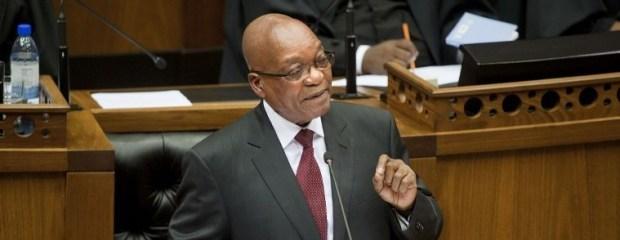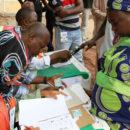#Paybackthemoney! Brawl at SA parliament opening highlights crisis of Zuma presidency – by Desné Masie

 No one expected South Africa’s State of the Nation Address (SONA) last Thursday to be business as usual. President Jacob Zuma had not attended parliament since August 2014, apparently in an effort to avoid continued questioning by the opposition about the use of around $22m in public money to upgrade his personal residence at Nkandla, KwaZulu Natal (KZN). With water cannon used on opposition Democratic Alliance (DA) protestors outside parliament, and the Economic Freedom Fighters’ (EFF) opposition MPs threatening to question the president about Nkandlagate, everyone knew the 2015 opening of parliament was going to be a cracker.
No one expected South Africa’s State of the Nation Address (SONA) last Thursday to be business as usual. President Jacob Zuma had not attended parliament since August 2014, apparently in an effort to avoid continued questioning by the opposition about the use of around $22m in public money to upgrade his personal residence at Nkandla, KwaZulu Natal (KZN). With water cannon used on opposition Democratic Alliance (DA) protestors outside parliament, and the Economic Freedom Fighters’ (EFF) opposition MPs threatening to question the president about Nkandlagate, everyone knew the 2015 opening of parliament was going to be a cracker.
The SONA proceedings kicked off with a series of suspiciously Orwellian AV problems; the jamming of mobile phone signals rendering journalists unable to tweet and text out of parliament; public order police throwing out EFF MPs in a cloud of fisticuffs; and the walkout of the entire DA. Only after an hour, did Zuma resume the podium laughing heartily, and inappropriately, at the chaos before rambling off a speech that was widely evaluated to be boring and without vision or meaningful solutions.
Scenes of parliamentary violence and chaos are witnessed in governments all around the world, however, the tumult in the chamber during the SONA is unprecedented in the country’s young democracy, and is extremely concerning. The SONA itself dealt with some important issues, such as the potentially debilitating crisis at the power utility Eskom, but the biggest story was the state of the Zuma presidency itself.
Nkandlagate: “The small matter of a $22m house on a hill in KwaZulu Natal”
The brawl at the opening of parliament highlighted the nadir of the national crisis that is the Zuma presidency. Journalist Justice Malala tweeted: “One must not forget that all this is happening because there is the small matter of a R246-million house on a hill in KZN”. South Africans are, quite rightly, fed up with Zuma. His leadership has been punctuated by one controversy after another as well as accelerated economic decline.
The Nkandla controversy, in which Zuma is said to have unduly benefited from $22m of public money to upgrade his personal residence, was the final straw in a long series of outrages and brushes with the law. Zuma’s deployment of ANC party cadres, to whom he owes various personal and political debts, also inhibits state organs from circling in on the allegations of corruption, money laundering, fraud and racketeering which dog him.
Zuma’s presidency is the consequence of and contributor to continued factionalism within the ruling African National Congress’ (ANC) tripartite alliance also comprising the South African Communist Party (SACP) and the Congress of South African Trade Unions (COSATU). The opposition parties, most notably the EFF, have been pressurising Zuma to account for Nkandla, and as a result he has not been turning up in parliament, in flagrant disregard of his duty as the president and accountability to the South African people.
#Paybackthemoney and #Bringbackthesignal
While some analysts see the tensions between Zuma and the EFF’s leader Julius Malema as reflective of past animosities and a major clash of supernova-sized egos, EFF MPs are doing important work for South Africa’s democracy in keeping Zuma accountable.
The EFF have, since being elected to parliament in 2014 with a respectable 6.35% of the vote, used their role as parliamentarians to keep Nkandlagate firmly on the agenda with the chant and hashtag #paybackthemoney. The leftwing, pro-worker party has found a surprising ally in common cause with the centre-right, market-liberal DA. Parliament last year saw several confrontations between the two opposition parties and the speaker, Baleka Mbete, who is often called to task for perceived abuse of her parliamentary privilege to protect Zuma from difficult lines of questioning. She has also been under fire for calling the EFF a Western conspiracy and Malema “a cockroach”.
Opinions differ, but Mbete’s handling of the events on Thursday – for example, in not fully respecting the right of MPs to ask questions during proceedings – has been widely lambasted by the opposition and the media. The appearance of the “White Shirts” (so named for their attire) – called in by Mbete to remove the EFF members – has also been criticised.
The DA parliamentary leader Mmusi Maimane asked the speaker to clarify whether the White Shirts were police or not, and when Mbete deferred such clarification, the DA walked out of the chamber en masse – and much debate followed over the constitutionality of police entering parliament. Another issue pushing the limits of the grey areas of the constitution on Thursday was the jamming of the mobile phone signal, which prompted journalists present to chant “bring back the signal!” If intentional, this was not only unconstitutional in preventing the work of parliament being done openly, but may also constitute a crime. Africa Check has confirmed that the Independent Communications Authority of South Africa prohibits the jamming of mobile phone signals in the republic.
South Africans may not all agree with the manner in which the EFF conducts itself in parliament, and find the resultant filibusters a national embarrassment, but if the Red Overalls don’t persist in asking for answers on Nkandla who will?
The state of the nation and a crisis of power
The SONA speech itself was widely regarded by economic and political analysts as a fail. Despite some breezy nation-building propaganda, and the rattling off of promising statistics, the main topic was the power crisis facing South Africa, which has suffered for the past 6 years from chronic electricity blackouts or “load shedding“ due to infrastructure and management problems at the energy parastatal Eskom.
The frequency of these blackouts is frustrating South Africans and slowing down the already decelerating economy. Zuma announced R23bn ($2bn) to be allocated to Eskom, which is in addition to the R14bn ($1.2bn) raised on the bond markets last week. But, that is only R37bn ($3.2bn) and Eskom needs more like 225bn ($20bn), or a miracle.
The beleaguered finances and general mismanagement of Eskom reflect the parlous state of several of South Africa’s parastatals. Included in these ailing moneysinks are the national airline SAA, the SA post office and the SABC. The new finance minister Nhlanhla Nene, warned in his 2014 medium-term budget policy statement that there wasn’t much more money left to prop these up, with the national deficit running at almost half of GDP.
The speech also addressed land reform, which remains a tense and important issue. Zuma announced the proposed promulgation of the Regulation of Land Holdings Bill, which contemplates a ceiling of land ownership to be set at a maximum of 12, 000ha. Foreign nationals will not be allowed to own land in South Africa but will be eligible for long-term lease.
The other big issue in the SONA was job creation, and the speech professed progress on this front, but analysts think the figures have been somewhat massaged. Zuma announced that Statistics South Africa’s employment figures for the last quarter of 2014 showed that 15.3m of South Africa’s 54m strong population is now in employment, and that jobs grew by 203,000 in the period. South Africa’s target for new job opportunities is set at one million per annum in terms of its National Development Plan – the government announced that 850,000 have been created thus far.
In addition to various existing job-creation schemes focusing on youth, Zuma announced a nine-point plan to ignite growth and create jobs that focused on resolving the energy crisis, agribusiness, adding value to mineral wealth, action on industrial policy, private sector investment, action on workplace conflict, a focus on SMEs and co-operatives, an increase in the state’s role in ICT and transport infrastructure and the growth of the ocean economy. Despite all the apparent constraints, Zuma’s speech was optimistic in its overall tone. “Siyaqhuba. Siyasebenza. (Zulu: We are moving forward. We are a nation at work)”, he said.
Can we hope for the ANC to find its moral compass?
Huge challenges remain for South Africans on both the economic and political front. With the DA emboldened by its increased share of the vote to 22.2%, and the departure of powerful union National Union of Metalworkers of South Africa (Numsa) from COSATU late last year, the political landscape has atomised. But the fracturing of the ANC and its tripartite alliance need not be evaluated as a threat to national cohesion – the pluralism evident in the strengthening of the opposition could be extremely positive for South Africa if civil society also mobilised around the issue of accountability with conviction and resolve.
South Africans may not like the scenes witnessed in parliament; change can be scary and requires courage. But if it means South Africa sheds the toxic effects of Zuma’s presidency, this can only be a good thing. If Zuma persists in not admitting wrongdoing with regard to Nkandla, demands for his immediate recall will only grow louder. The ANC must stop protecting Zuma and recalibrate its moral compass.
Dr Desné Masie is an analyst of geopolitical economy with particular interest in international finance and African Affairs.





Zuma apera basa.
Great article doc, I loved it. I have never believed that Jacob Zuma (JZ) was the right guy for South Africa’s presidency. Like I said before, we elected them, why are we crying? We chose the hyenas to protect us, why are we crying when they are devouring our children?